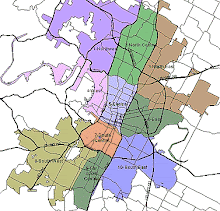Perhaps the most contentious conversation in Austin is the idea that Austin needs a rail. There are two problems with rail: 1) people don't want to pay for it; and 2) people are addicted to their cars.
Today, we discussed the newest cause for strife: the streetcar. Here, people are largely concerned with where it goes and how to fund it. In my opinion, because the streetcar would open more areas to new development, developers who have money would be great sources of funding, and the streetcar might open the doors for more public-private funding and remove a source of tension. Also, a streetcar allows the potential for more urban rail, provided that Austinites work with the city and the developers to make a successful experience for the first streetcar. On the other hand, there are several native Austinites (and some new) who oppose the newest addition to public transit because they don't want to make it easier for developers to take over new land, and they don't know the public impact. My understanding is that as long as there's another way for people to get to work, people will use it.
Otherwise, the Committee watched a presentation by Capital Metro that further discussed the transit plans already in progress. This was interesting largely because most of the information presented is available on their website. There was one interested citizen who was speaking for "native Austinites" who created a moment of tension for the notion that the city had numbers for transit but no numbers for development. I would argue that development spurs from the interest of people. If no one wants to live in a certain area, there would be no development. If people don't support development in a certain area, development discontinues. Obviously, if people like a certain area, there will be more development. I am interested in seeing more businesses in Austin, and I for one would try my best to support more local start ups, because we need the jobs.
The one important thing for all Austinites to remember is that even if there were no growth in Austin and no people coming, there would still be higher gas prices. A lot of people in U. S. cities that aren't growing are facing the depressing reality that there isn't justification for more public transit (or highway construction), but people still have to get to work. It's devastating that because people are married to their automobiles, life requires people who make less than $30,000 to spend 25% or more on work transit.
Subscribe to:
Post Comments (Atom)

No comments:
Post a Comment